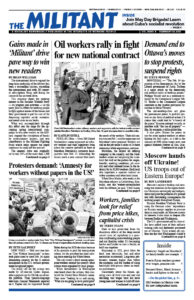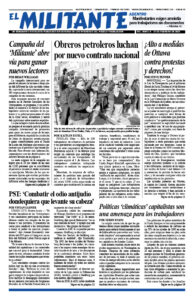MONTREAL — “The Feb. 14 imposition of the Emergencies Act by the Liberal government of Justin Trudeau is a major attack on the democratic and political rights of working people,” Philippe Tessier said in a statement released by the Communist League Feb. 15. Tessier is the Communist League candidate in the Quebec provincial by-election in Marie-Victorin.
The anti-working-class act gives the government power to prohibit protests or any form of political action if it claims they could lead to “a breach of the peace,” threaten national security, or interfere with “the use of property” — like, for example, a strike picket line.
It also gives Ottawa the power to use the army against workers or others fighting for their rights, as it did in the summer of 1990 when troops were sent against Mohawk Natives in Oka, Quebec, fighting the theft of their land.
The Emergencies Act also gives increased powers to the police and the courts, including to impose fines of up to $5,000 and prison sentences of up to six years, and to seize vehicles used in the protests.
The protests in Ottawa, Canada’s capital, were initiated by truckers, who face restrictions on their right to work. These actions have continued for over three weeks and include many others who focus on ending government vaccine mandates.
The Canadian Armed Forces is investigating at least six soldiers who they say have publicly showed support for the protests against vaccine mandates and other COVID-19 measures. Canadian authorities claim their military forces are not allowed to make public comments counter to the government’s political line.
A six-day blockade of the Ambassador Bridge between Windsor, Ontario, and Detroit — the route for 25% of the trade between Canada and the U.S. — was ended by police Feb. 13 after the Ontario provincial government got a court order. “We’re going to throw every tool we’ve got at you,” said Doug Ford, Ontario’s Progressive Conservative premier.
The Canadian government and the liberal press — both here, in the U.S. and beyond — have tried to smear the protesters as reactionary, violent, boorish fools. In his Feb. 14 opinion piece, Al Jazeera columnist Andrew Mitrovica called the protesters “smug, mostly white, surplus-store-camouflage-gear-wearing louts.” Liberals like him are simply expressing their fear and hatred of the working class.
The fact is the protests, marked by Canadian flags, anti-vaccination slogans and calls for “freedom,” have been overwhelmingly peaceful.
“Ottawa is using the fact that many workers as well as others disagree with aspects of the ‘Freedom Convoy’ to give the federal government, its political police, the RCMP, and other police forces, sweeping powers to limit our right to protest and to speak out against government abuse,” Tessier said.
Large numbers of workers do sympathize with the need to dial down government restrictions after over two years of shutdowns and travel bans.
1970 War Measures Act
The last time Ottawa did something similar was in 1970, when the Liberal government of Pierre Trudeau, father of the current prime minister, imposed the War Measures Act and sent 8,000 Canadian troops to Quebec. Some 500 people were arrested without warrants, including prominent trade union leaders, fighters for Quebec independence, socialists, leaders of what is now the Communist League, artists and others.
Ottawa’s sweeping attack on democratic rights then was to crush the mass movement against the national oppression of the Quebecois and the interconnected rise of workers’ struggles in Quebec and elsewhere. The Emergencies Act replaced the War Measures Act in 1988 and is being invoked for the first time.
Tessier, a rail train conductor and member of the Teamsters union, called on unions and all supporters of democratic rights to speak out against the imposition of the Emergencies Act and to protest against it.
“Ottawa has been looking for a pretext to increase its powers and those of the cops to limit the democratic and political rights of working people and our allies,” the Communist League candidate said. “As the economic, social and political crisis of the capitalist system deepens they will need to step up their attacks against working people and our organizations.”
“What if tomorrow some trade union wants to organize a protest?” Arshdeep Singh Kang, a long-haul trucker based in Brampton, Ontario, asked in an interview with the Militant. “The government could attack them. This is not right. We should oppose this.”
Last April 30 the Trudeau government declared a strike by over 1,100 longshore workers at the Port of Montreal to be illegal. It claimed the strike was harming the economy, one of the main pretexts they’re using to attack today’s protests. The port workers were fighting unsafe and intolerable work schedules. In June 2011, the Conservative government of Stephen Harper did exactly the same thing, declaring a strike by postal workers against concession demands illegal.
Kang, one of the leaders of a fight by truckers against bosses’ wage theft, said, “I am not a supporter of the Freedom Convoy and I don’t agree with many of the things they do. But I am not in favor of the government crushing their right to protest.” This law is “a serious violation of our fundamental right of expression.”
The Canadian Civil Liberties Association issued a statement condemning the government action. Mark Grieve, a Toronto ready-mix trucker and a member of the Teamsters union, said the imposition of the Emergencies Act is “grotesque.”
“The government has done nothing to support working people in more than two years of the pandemic and now say they need to do this, partly because of the pandemic,” he told the Militant. “They also claim the Ottawa protests are violent. But that’s not true.
“The unions should oppose this law,” he said. “We need to defend the right to protest and oppose giving the police more powers.”

